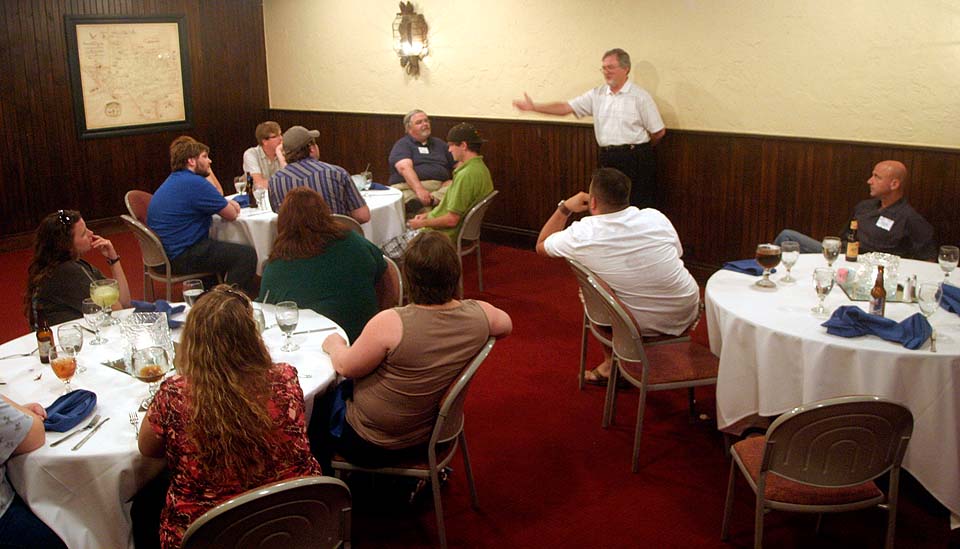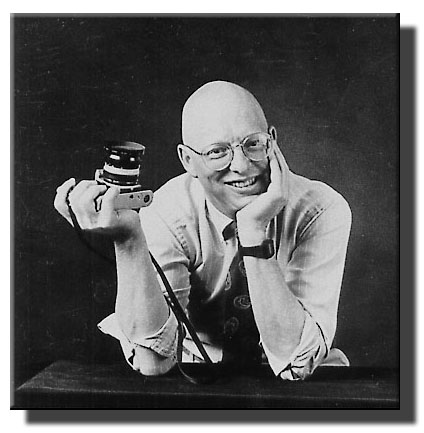Cindy Royal, a faculty member at Texas State University in San Marcos, has a great piece in Online Journalism Review about how news organizations can create “user experiences” on their websites. Some of her examples, such as the New York Times products she references, may seem out of reach for community newspapers, but many of them are very easy to do with free online tools that are already out there.
Month: May 2009

Our page design workshop has kicked off in Fort Worth.
The group, led by resident page design guru Broc Sears, began with dinner at the Fort Worth Stockyards and will continue Thursday on the TCU campus with an intense 14 hours of instruction, some hand-on time and group discussions.
Steve Levering, another faculty member at the Schieffer School, will also be teaching a few sessions.
Check out the photos here and on our Facebook page.
The workshop is paid for by the Texas Newspaper Foundation, which covers tuition, lodging and food costs for all of the workshoppers.
Watch this website in the future for announcements about our next workshop. And check out this page for more information about TCCJ workshops.





The New York Times has hired a “social media editor” who is going to be connecting with users on Twitter, Facebook and other social media platforms. The first link is a blog post from Mashable, a blog about social media trends. The second link is to the new social media editor’s Twitter account.
How to approach a video story
Colin Mulvany (The Spokane, Wa. Spokesman Review) just posted some great tips on how to approach video storytelling. This isn’t the type of how-to that goes through what buttons to push and what menu items to click, but it provides some very helpful advice on adjusting to the video mindset and getting the most from your video stories.
Not so fast…just because they are “out there for everyone to see for free” doesn’t automatically give you the green light to run them as you please. While the first amendment grants us great leeway and courts have determined that prior restraint isn’t allowed (with rare exception…troop movements, etc.) this doesn’t give you carte blanche to scavenge in Internet for photos of little Billy scoring the winning run in yesterday’s extra-inning thriller and plant them on the sports page.
Although sites like Flickr encourage sharing of photos, it’s not without conditions. Flickr even allows various licensing levels to be selected by their users, further muddying the copyrights water. For instance, a user can set the license usage for their work as “public domain” if they so choose. If no licensing level is set though, does that mean they are automatically in the “public domain?” Can a newspaper claim a “fair use” exemption?
If the game becomes a legitimate news event, (such as a photo of someone during the game who is later abducted, murdered, killed in a car wreck on the way home, or even wins some great prize), you might have a better “fair use” defense for publication, but despite no clear copyright label, under current copyright law an image is copyrighted the instant it is created by the photographer, unless it was created under a “work for hire” agreement. Absent such an agreement (or any other written or verbal contract or permission), legally you are violating the image creator’s copyright, which is punishable by a fine of up to $150,000 per incident.
Of course most courts are lenient if you show a good faith effort to remove the photo that is in violation (especially on websites), but it’s a little harder to do in print…and an apology and correction won’t always absolve you of any monetary liability. Courts tend to see this as a copyright issue, not a freedom of press issue, and a photo does NOT have to be officially copyrighted or even labeled as such to invoke copyright protection, although if the copyright owner does not register their creation within 90 days of publication (their original publication on say Flickr, not YOUR re-publication of their images) it does limit damages that can be awarded to “actual damages” (which would be fair market value of the image). Also, for any NON-PUBLISHED images, the author has up to 5 years after creation to register their copyright in order to collect punitive damages.
Remember, all images are automatically copyrighted by their creator unless they are covered under “work for hire” rules, such as your editorial employees. Even a freelancer in your employ is not automatically covered by “work for hire” copyright rules, so make sure you have an agreement with the photo’s owner before you publish it…otherwise you may find yourself dealing with a copyright attorney.
For more information about photography and copyright law, go to http://templatelab.com/copyright-basics/.
If an article on high school kids and their yearbooks seems a little off-topic for a forum on community journalism, think again.
What’s happening here? We have a traditional medium – paper and pictures. Something all of us grew up with and looked forward for a year to receiving. But today’s Facebook/Twitter/Websavvy crowd is less and less interested in a medium lots of us thought would never die. It’s not that they don’t care about reading about themselves and their classmates, or seeing their pictures. In fact, they are probably more interested than ever. They’re just getting that in different ways, and a yearbook delivery system for that interest seems archaic to them.
Some day soon, these kids will be our primary target audience. Will kids who have rejected yearbooks have any interest at all in an ink-on-newsprint product? Read about the yearbook trend in this Dallas Morning News story
If you follow the Center’s Website, you’ve read a lot about the growth of community journalism in places you wouldn’t have thought of as being homes of community media – like New York City and Chicago and LA. And you know by now that community journalism is no longer a place – it’s an attitude. Even a few years ago, community journalism was journalism as practiced in communities – typically smaller towns or rural areas. No more. Now community journalism is an attempt by larger newspapers and TV stations to reclaim their local – community – roots, and thereby to reclaim their audience. To see the extent of what’s happening, check out this Pew research report, a content analysis of 46 metro areas that found 145 online sites that they defined as community journalism.
This writer finally did it — he gave up his daily newspaper subscription in favor of getting his news online. Even if you don’t encounter a lot of folk with this dilemma, what he has done will be more and more common. So take the time to read Mark Glaser’s blog post, Kicking Ink: The Struggles of a Print Newspaper Unsubscriber.
In a short video interview, Kevin Hessel from the Marin Independent Journal shares some of the ways he uses social media at the Marin (Cali.) Independent Journal to engage readers.

Jock Lauterer, who teaches community journalism at the University of North Carolina in Chapel Hill, is an old friend of the Center and of Texas journalism. He has spoken at several of our seminars.
Follow the link below for a down-home look at several successful weeklies in North Carolina — weeklies that follow the same pattern of successful weeklies in smaller communities in Texas. You’ll enjoy Jock’s perspective on just what accounts for their success in those communities.
Click here for the story, “What’s the secret of N.C.’s successful weeklies?“
